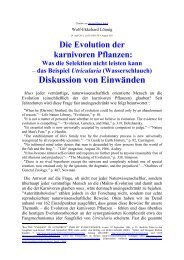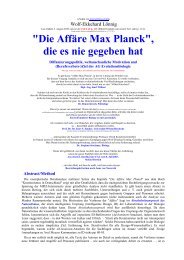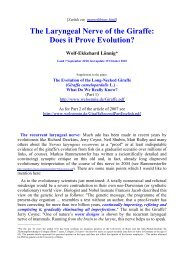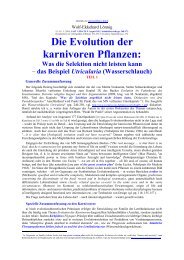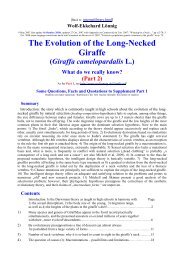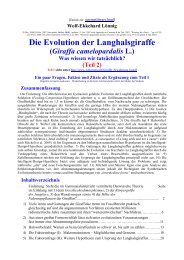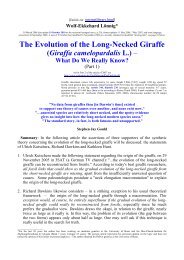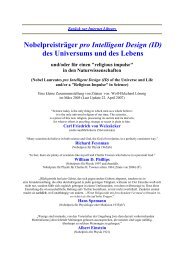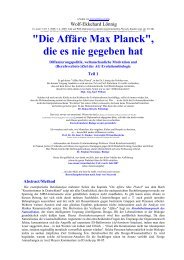Unser Haushund: Eine Spitzmaus im Wolfspelz? - Wolf-Ekkehard ...
Unser Haushund: Eine Spitzmaus im Wolfspelz? - Wolf-Ekkehard ...
Unser Haushund: Eine Spitzmaus im Wolfspelz? - Wolf-Ekkehard ...
Sie wollen auch ein ePaper? Erhöhen Sie die Reichweite Ihrer Titel.
YUMPU macht aus Druck-PDFs automatisch weboptimierte ePaper, die Google liebt.
132"However, two independent studies have found that wolves reared by humans are not as skilled as dogs inusing human social behaviors to find hidden food [11,39].”Okay, Wölfe sind "not as skilled as dogs” reading human social andcommunicative behavior insbesondere pointing gestures to find hidden food. DieAntwort liegt vielleicht hier: Miklosi, A. et al. (2003) A s<strong>im</strong>ple reason for a bigdifference: wolves do not look back at humans, dogs do. 232 [Nachtrag: diese Aussagen sindnach Range und Virányi (2011) falsch; siehe nächste Seite]. Oder in den Worten von Reid (2009,p. 325): "A predisposition [of dogs] to attend to human actions allows for rapidearly learning of the association between gestures and the availability of food.” 233Uddel et al. lehnen die These von Hare und Tomasello ("heritable component",which "initially evolved during domestication") mit folgenden Worten ab (2010, p.327):"The "Domestication Hypothesis" asserts that during domestication dogs evolved an inherent sensitivity tohuman gestures that their non-domesticated counterparts do not share. According to this view, sensitivity tohuman cues is present in dogs at an early age and shows little evidence of acquisition during ontogeny. A closerlook at the findings of research on canine domestication, socialization, and conditioning, brings theassumptions of this hypothesis into question. We propose the Two Stage Hypothesis, according to which thesensitivity of an individual an<strong>im</strong>al to human actions depends on acceptance of humans as social companions,and conditioning to follow human l<strong>im</strong>bs. This offers a more pars<strong>im</strong>onious explanation for the domestic dog'ssensitivity to human gestures, without requiring the use of additional mechanisms.” 234Die Rückkopplung zwischen Mensch und Hund sowie zwischen Mensch und Fuchskönnte entscheidend auf die oben beschriebenen Veränderungen des Hormonhaushaltszurückzuführen sein (und vielleicht auch auf epigenetisch maskierte Genfunktionen,d. h. Funktionen, die demnach sowohl be<strong>im</strong> <strong>Wolf</strong> als auch be<strong>im</strong> Fuchs schonvorhanden waren). Wir erinnern uns zu den Füchsen: "A genetically determinedpolymorphism for the expression of aggressive and fear responses to humans wasrevealed in the farmed fox populations” (Trut et al. 2012). Hare und Tomasello führenzusammenfassend zur Fuchsdomestikation u. a. folgende Punkte auf (p. 441):"As would be predicted, exper<strong>im</strong>ental foxes show little fear and aggression towards humans [63]. Thisreduction in aggressiveness and fear is probably due to attenuated activity of the pituitary–adrenal axis.The common pool of circulating glucocorticoids, their in vitro production, the basal level of theadrenocorticotrophic hormone (ACTH), and the adrenal response to stress were all reduced in theexper<strong>im</strong>ental foxes relative to the controls [64]. Subsequently, the activities of the serotonin,ended [39]. This is not to say that dogs are more skilled than wolves in all domains. Studies comparing wolves and dogs on s<strong>im</strong>ple non-social problem solving ormemory tasks typically find that wolves perform as well if not better than dogs [11,40–42]. Overall, these comparisons do not support the hypothesis that dogsinherited their social skills directly from wolves.[…] This leaves the possibility that dogs' social skills evolved during the process of domestication; that is, during the tens of thousands of years that our twospecies have lived together.[…] Luckily, dogs are not the only domesticated canids. A unique population of foxes has also been exper<strong>im</strong>entally domesticated (see Box 2). During the processof domestication individual foxes were selected for breeding based solely on their tendency to approach humans fearlessly and non-aggressively. When fox kitsfrom this domesticated population were compared with age-matched dog puppies on the basic pointing and gazefollowing tests, the foxes were as skilled as thedogs in using the human social cues. In addition, when compared with a population of control foxes that were bred randomly in respect to their approach towardshumans, the domestic foxes were more skilled than the controls at using human social cues (although there was no difference between the two populations in a nonsocialtask). Crucially, neither population of foxes was bred or tested for their ability to use human communicative gestures or behaviors. Therefore, these findingsconfirm the likelihood that dogs' unusual ability to read human social-communicative behaviors evolved during the process of domestication, and in addition identifya selection pressure that is likely to have played a role in driving the evolution: selection against fear and aggression towards humans [43].”232Miklosi, A. et al. (2003): A s<strong>im</strong>ple reason for a big difference: wolves do not look back at humans, dogs do. Current Biololy 13, 763–766(http://www.ncbi.nlm.nih.gov/pubmed/12725735)233Reid, P. J. (2009): Adapting to the human world: dogs' responsiveness to our social cues. Behavioral Processes 80: 325-333.(http://www.ncbi.nlm.nih.gov/pubmed/19056474. Abstract: Dogs are more skilful than a host of other species at tasks which require they respond to humancommunicative gestures in order to locate hidden food. Four basic interpretations for this proficiency surface from distilling the research findings. Onepossibility is that dogs s<strong>im</strong>ply have more opportunity than other species to learn to be responsive to human social cues. A different analysis suggests that thedomestication process provided an opening for dogs to apply general cognitive problem-solving skills to a novel social niche. Some researchers go beyond thisaccount and propose that dogs' co-evolution with humans equipped them with a theory of mind for social exchanges. Finally, a more prudent approach suggests thatsensitivity to the behaviours of both humans and conspecifics would be particularly advantageous for a social scavenger like the dog. A predisposition to attend tohuman actions allows for rapid early learning of the association between gestures and the availability of food.)234 Uddel, M. A., Dorey, N. R. and C. D. Wynne (2010): What did domestication do to dogs? A new account of dogs' sensitivity to human actions(http://www.ncbi.nlm.nih.gov/pubmed/19961472).



